Hey, this sounds like the Next iPhone which I was hoping might show up to do battle with Sprint’s EVO 4G…
Tag Archives | Sprint
More E-Reader Impressions: Skiff
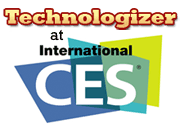 Unlike Plastic Logic, new e-reader arrival Skiff isn’t showing off its stuff on the show floor. But it’s demonstrating its reader–which it’s only saying will arrive sometime in 2010, at an unspecified price–in a private room. I got a sneak peek, and came away intrigued.
Unlike Plastic Logic, new e-reader arrival Skiff isn’t showing off its stuff on the show floor. But it’s demonstrating its reader–which it’s only saying will arrive sometime in 2010, at an unspecified price–in a private room. I got a sneak peek, and came away intrigued.
Physically, the Skiff reader looks a lot like Plastic Logic’s Que–it has a magazine-sized screen, a touch interface, and a thin case. Both readers use their extra real estate and resolution to render pages with more style and fidelity than is afforded by the smaller screens on the Kindle and Nook. But while Plastic Logic is pitching the Que as a business tool, Skiff is focusing on making magazines and newspapers easy to get and read. The demo I got involved digital versions of the Wall Street Journal and Esquire that maintained a newspaper and magazine-like feel, respectively, along with the typography, art, and layouts you associate with those two publications. They’re not exact replicas of the print incarnations, though–they’re scaled to the available screen space on the Skiff. And the ads provide some interactivity, such as a car one that lets you find a local dealer.
4 comments
5Words for Monday, September 14th, 2009
 Like 5Words? Subscribe via RSS.
Like 5Words? Subscribe via RSS.
NYTimes.com delivers ad-based malware.
FTC stops Sears, Kmart spying.
Apple’s hogging all the flash.
No comments
Free Cell-to-Cell Calls From Sprint
TechVi broke this news, which is now official:
Any Sprint customer on the base $70 / month plan, which includes unlimited data, text and MMS messages, and 450 minutes, will be able to call any other cell phone on T-Mobile, Verizon, or AT&T without using plan minutes.
That’s not unlimited calling, but for some people, it would be darn close. I wonder what percentage of the average American’s cell phone calls are to another cell phone, and how that figure has changed in the last decade
2 comments
Palm Announces the Pixi
It’s been the subject of rumors for months–including ones that said it was on hold–and now it’s official: The second WebOS phone from Palm is on its way. It’s called the Palm Pixi (rumors had the code name as Eos or Pixie) and it looks to be a Centro to the Pre’s Treo: a cheaper, simpler member of the family. It’s got a one-piece case, eighty fewer pixels of vertical resolution, no Wi-Fi, and a slower CPU than the Pre. Other than that, it seems to have the Pre’s important features, including its 8GB of memory. And it’s thin. Really thin. Like, thinner than an iPhone thin. Engadget, which has a good hands-on write-up with video, is impressed overall.
The Pixi is premiering on Sprint in time for the holidays; Palm isn’t announcing the price, but the Pixi announcement also included the news that the Pre is now $149 after rebates with a two-year Sprint contract. (That’s not $99, but it is a $50 price cut.) If the Pre is $149, it seems all but a done deal that the Pixi will be $99, and that the Pre won’t drop to that price anytime soon.
With the Pixi all official, the single biggest Palm-related question is now this: When will a WebOS phone show up on a carrier which isn’t Sprint?
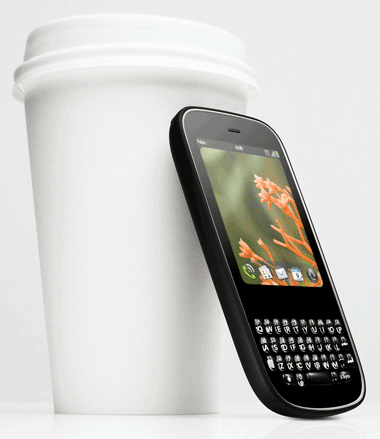
4 comments
Sprint: The Pre is on Sale. No, Wait, Forget It!
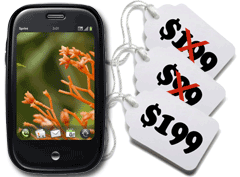 Well, this is weird and embarrassing: All Things Digital’s John Paczkowski, who reported earlier today on a $100 discount for new Sprint customers who bring their phone numbers from another carrier that brought the final price of the Palm Pre to $99, has posted a new story saying that Sprint has decided to pull the offer a few hours after it announced it. The deal was supposed to last through October 10th; instead, it turned into an Incredibly Limited Time Offer.
Well, this is weird and embarrassing: All Things Digital’s John Paczkowski, who reported earlier today on a $100 discount for new Sprint customers who bring their phone numbers from another carrier that brought the final price of the Palm Pre to $99, has posted a new story saying that Sprint has decided to pull the offer a few hours after it announced it. The deal was supposed to last through October 10th; instead, it turned into an Incredibly Limited Time Offer.
Sprint is saying that it’s yanking the promotion because it was “put into the system in error,” but there’s just gotta be more of a backstory here.
Paczkowski notes that the offer is still live on Sprint’s site–and yup, it’s still there as I write this.
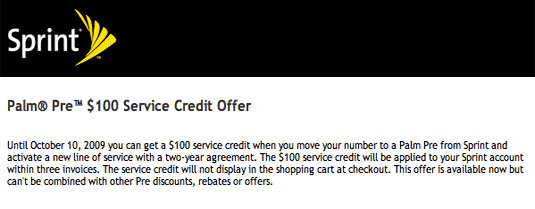
The whole story points out a basic issue with the Pre: By introducing the iPhone 3GS at $199 (with a two-year contract) and knocking the original iPhone 3G down to $99, Apple succeeded in making the $199 Pre (which has 8GB of memory vs. the 3GS’s 16GB at that price point) look a tad pricey. I imagine it’s inevitable that Palm will need to release a 16GB Pre for $199, or work with Sprint to get the price of the 8GB down to $99. Or both.
I continue to find the Pre to be the most impressive iPhone rival that’s actually on the market–upcoming Android phones could change that–and to hope that it’s a hit, both because it deserves to be one and because Apple needs the competition. For what it’s worth, I’ve been surprised by the number of folks I’ve encountered lately who have bought Pres recently–and all of them have told me they’re pleased with their purchase. Of course, I live in a hotbed of phone geekery, so my random encounters with Pre owners may or may not be representative…
2 comments
Take Back the Beep!
My friend David Pogue of the New York Times is a man on a mission. He’s become irate over the time that cell phone company voicemail systems spend playing a recorded message telling you to leave a message, explaining how to send a page, and suggesting that you hang up when you’re done leaving the message. The messages are pointless little annoyances every time you hear them–and since they take fifteen seconds or so to play, they eat up the monthly minutes of the person who called.
David is trying to rally phone users to bury carriers in such a surging sea of complaints that they enter the 21st century by ditching these obsolete recorded messages. It’s a great idea. His post about all this includes instructions on how to tell your carrier you’re part of the crusade.
Of course, it’s not just that 15-second message that’s irritating–voicemail systems in general tend to sport the most aggravating user interfaces this side of automated supermarket checkouts. One of the nice things about using an iPhone and/or Google Voice is getting to avoid those convoluted menus…and David says that Apple insisted that AT&T eliminate the 15-second message for iPhone voicemail. Which proves it can be done–you know of anyone who’s called an iPhone owner, been bounced into voicemail, and gotten confused by the lack of instructions?
14 comments
A Netbook for the Price of a Newspaper
 JK on the Run’s Kevin Tofel has noticed an eye-popping deal currently being offered by Best Buy: Sign up for a two-year Sprint EVDO contract at sixty bucks a month, and you can buy a Compaq netbook for ninety-nine cents. The netbook goes for $389.99 without a contract, so it’s a discount of a whopping $380.
JK on the Run’s Kevin Tofel has noticed an eye-popping deal currently being offered by Best Buy: Sign up for a two-year Sprint EVDO contract at sixty bucks a month, and you can buy a Compaq netbook for ninety-nine cents. The netbook goes for $389.99 without a contract, so it’s a discount of a whopping $380.
Except, of course, that it isn’t–you’re on the hook for $1200 over two years in broadband charges, and can’t get out of the contract without paying a penalty. On the other hand, you’re likely to pay sixty bucks a month for wireless broadband even if you don’t buy the Compaq netbook, and Sprint charges after-rebate contract prices of up to $99 for EVDO adapters. Maybe the best way to look at the Compaq is this: It’s an EVDO adapter that happens to have a computer attached to it.
Ultimately, the best way to judge most subsidy deals is to ask yourself what the chances are that you’ll still be happily using the subsidized device and the service in question at the end of the contract. If you can imagine yourself carrying a midrange 2009 netbook and using EVDO through mid-2011–and aren’t worried about being joined at the hip with Sprint for 24 months–it wouldn’t be nuts to consider buying the Compaq. Then again, small computers are going to get a lot cooler over the next couple of years, and 4G data will start to matter; I think the Compaq will start to feel a tad stale by late 2010.
One thing’s for sure: The Sprint offer is more tempting than the equivalent ones from AT&T and Verizon, which bring the price down to $199.99 rather than $0.99.
Full disclosure: I used to insist that I’d never sign another contract again, but I’m currently wed to both AT&T (for an iPhone 3GS) and Verizon (for an EVDO adapter) until 2011.
One comment
Palm Pre Selling Better than Expected: Analyst
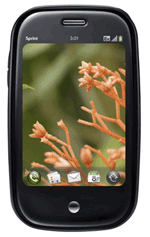 Both Sprint and Palm have a lot riding on the Palm Pre. In Sprint’s case, the carrier desperately needs a hit to help it stop bleeding customers. For Palm, its much more serious: either the Pre is a success, or the company itself may fail.
Both Sprint and Palm have a lot riding on the Palm Pre. In Sprint’s case, the carrier desperately needs a hit to help it stop bleeding customers. For Palm, its much more serious: either the Pre is a success, or the company itself may fail.
According to Charter Equity Research analyst Edward Snyder, neither company has anything to worry about. While early estimates pegged initial Pre sales at 150,000 units, Snyder believes that the actual number is about twice that.
He says that his own checks show that demand for Palm’s touch screen device remains strong, and Palm is churning out about 15,000 Pres per day. At that rate, Sprint should have about 1 million of the devices to sell in the upcoming summer quarter. Neither Palm nor Sprint have so far commented on the report.
One comment
Verizon vs. Sprint vs. AT&T
 Sprint claims to have “America’s most dependable 3G network.” Verizon says it has “America’s largest and most reliable wireless network.” AT&T says it has “the nation’s fastest 3G network.” With wireless, in other words, everybody’s a winner–if you ask the carriers themselves.
Sprint claims to have “America’s most dependable 3G network.” Verizon says it has “America’s largest and most reliable wireless network.” AT&T says it has “the nation’s fastest 3G network.” With wireless, in other words, everybody’s a winner–if you ask the carriers themselves.
Which is why I admire what Mark Sullivan and my other PC World pals did: compare the three carries for upload speed, download speed, and reliability in thirteen cities. PCW conducted this ambitious real-world experiment in partnership with Novarum, using Ixia’s IxChariot tool. As Mark says in his story, the results are only a snapshot of how the networks did on a given day, in the particular locations in the specific cities that PCW and Novarum visited. But they’re interesting nonetheless. And they tend to jibe with some of the anecdotal impressions that folks have about the three carriers:
–The performance varied a lot from city to city.
–Out of the 13 cities, Verizon got the highest reliability rating in seven and Sprint got the highest one in six. AT&T didn’t score highest in reliability in any cities, and was often far behind its two competitors.
–Verizon got the highest download score in seven cities; Sprint scored highest in four; AT&T in two.
–AT&T had the highest upload score in ten cities; Sprint was highest in two; Verizon in only one.
The most notable result is AT&T’s lackluster download score. AT&T told PCW that it stands by its claim of being the nation’s fastest 3G provider, based on results from two independent firms and tests involving a million road miles and a million data sessions. I don’t dispute its stance. But PCW’s experiment is a useful reminder that claims about “America” or “the nation” may or may not reflect what you get in your own hometown. And it might help to explain why AT&T is the only one of the big three carriers who never talks about dependability or reliability in its ads.
